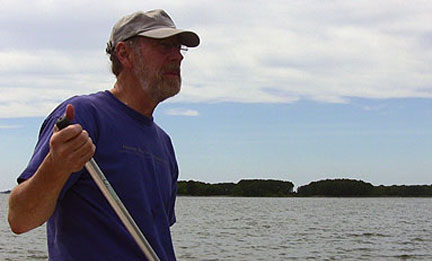Dr. Michael Kemp is a Professor at the University of Maryland
Center for Environmental Science
Horn Point Laboratory. He is a systems ecologist whose areas of research
include primary production and nutrient cycling; trophic structure and ecosystem energetics; and seagrass ecology. His research
interests include:
- Coastal marine ecology: ecosystem production; nutrient cycling; physical-biological coupling; global patterns; and benthic-pelagic interactions
- Ecosystem analysis: numerical models; comparative assessment; and scaling relations
- Seagrass ecology: light and nutrient relations; food-web interactions; and plant-sediment physiology-biogeochemistry
- Sediment nitrogen cycling: nitrification-denitrification; ammonification; and N-interactions with plants and macrofauna
The Chesapeake Bay estuary and watershed provides locally based field work opportunities and is the primary backdrop for
Michael's research. However, with the spread of eutrophication and hypoxia (also known as dead zones) in estuaries
throughout the world, Michael's work has regional, national and global relevance. This is reflected in his extensive
work with coastal managers and on international committees.
"I'm an ecologist. Everything is connected to everything." |
Much of Michael's work looks at the interactions between humans and the coastal environment – telling the story of ecosystems.
Making the step to outreach is thus a natural extension of his research interests. Having participated in many community outreach
activities throughout his career, when
COSEE Coastal Trends arrived,
it was a natural fit for him to get involved. And being able to provide career-building opportunities for his graduate students
through COSEE became a highly valued benefit. As someone who is involved in science to solve problems, Michael's ability to combine
his research with outreach has far-reaching implications.
Photographs and images for Michael's pages courtesy of Michael Kemp and COSEE Coastal Trends.


